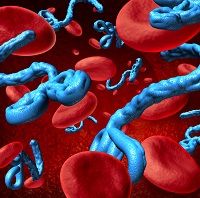Article
Third Ebola Patient in Dallas
Author(s):
A third patient has been diagnosed with Ebola in Dallas, TX. The unidentified woman is the second Texas Presbyterian Health worker to get the disease after caring for deceased Ebola victim Thomas Eric Duncan, local officials said in an early morning news conference. The patient, like nurse Nina Pham, is in isolation at Texas Presbyterian Health. The US Centers for Disease Control and Prevention (CDC) along with Texas health officials are monitoring 75 people who had contact with Duncan, the visitor from Liberia who died of the disease Oct. 8.

[EDITOR'S NOTE: Dallas hospital workers who had contact with deceased Ebola victim Thomas Eric Duncan are being ordered not to use public transportation, US Centers for Disease Control and Prevention Director Thomas Frieden, MD, said at a phone-in news conference today. Nurse Amber Joy Vinson should not have taken the commerical flight to Cleveland on Oct. 13 because she was in an exposed group and had a slightly elevated body temperature of 99.5 degrees, he said.]
[EDITOR'S NOTE: At a phone-in news conference. US Centers for Disease Control and Prevention Director Thomas Frieden, MD, said the second nurse patient, Amber Joy Vinson, is being transfered to an Atlanta, GE hospital with a bio containment unit. Nurse Nina Pham is recovering and so far no decision has been made about whether to transfer her to another facility, Frieden said.]
[EDITOR'S NOTE: The White House announced President Barack Obama has canceled travel plans to New Jersey and Connecticut to hold a meeting this afternoon on containing the spread of Ebola. The US Centers for Disease Control and Prevention said there were 132 passengers on the Frontier Airlines Flight from Cleveland that Ebola patient Amber Joy Vinson took to Dallas.]
[EDITOR'S NOTE: The US Centers for Disease Control and Prevention announced that the latest Ebola patient flew to Dallas from Cleveland on a commercial Frontier Airlines flight before becoming ill and has asked anyone on that flight to call a special phone number so arrangements can be made to monitor their health.]
[EDITOR'S NOTE: An earlier version of this story has been updated to include the patient's identify and that she is a nurse.]
A third patient has been diagnosed with Ebola in Dallas, TX. Amber Joy Vinson, 29, is the second Texas Presbyterian Health worker to get the disease after caring for deceased Ebola victim Thomas Eric Duncan, local officials said in an early morning news conference.
The patient, like nurse Nina Pham, is in isolation at Texas Presbyterian Health. The US Centers for Disease Control and Prevention (CDC) along with Texas health officials are monitoring 75 people who had contact with Duncan, the visitor from Liberia who died of the disease Oct. 8.
The officials did not say whether the latest victim was a nurse, but her family later confirmed her identity and that she is a registered nurse who cared for Duncan and lives alone. They also said that she had a fever and that a preliminary test confirmed Ebola.
At an early morning news conference, Dallas Mayor Mike Rawlings said “It may get worse before it gets better, but it will get better.”
The news came days after CDC Director Tom Frieden, MD, conceded that the CDC should have gotten more involved in helping the city and the hospital respond to Duncan’s case. It also focused attention on a growing debate over whether community hospitals can handle such cases.
Former Homeland Security Assistant Secretary for Health Affairs Alexander Garza, MD, MPH, said in an interview that such patients should be in special facilities.
“As soon as a test comes back positive, these patients should be moved to a biocontainment facility,” Garza said. He is currently associate dean for public health practice at the College for Public Health and Social Justice at Saint Louis University in St. Louis, MO. He is also a board-certified emergency physician.
Just as trauma patients who arrive at community hospitals are stabilized and then usually transferred to a trauma center, patients with infectious illness likely to be Ebola should be isolated, tested, and then sent to one of these 4 facilities. These hospitals have special biocontainment units with equipment like special air handling systems, a dunk tank for laboratory specimens, a pass-through autoclave, and “bio pods” available to safely transport or transfer infected patients. Staff there also go through specialized training.
In Dallas, a nurses’ union has complained that they received inadequate training and protective gear to use while caring for Duncan.
The federal bio containment centers are in hospitals in Omaha, NE; Missoula, MT; Atlanta, GA; and at a National Institutes of Health facility in Maryland. “These were built with federal money, and we should be using them,” Garza said, “Ebola is a high-risk situation.” When patients come into one of these 4 centers, “There is no second-guessing on how to care for them.” But combined, the facilities have fewer than 20 beds.
The CDC so far has said that community hospitals can care for Ebola patients and is focused on providing additional training.
“I think Dr. Frieden is not resisting the idea but he’s walking a fine line,” Garza said. Frieden is trying to “Avoid a disaster and at the same time telling the public we’re ok.”
Garza said he does not believe Ebola will turn into a major outbreak in the US, but that the US and other nations should be working harder to contain the virus’ spread in Africa.





